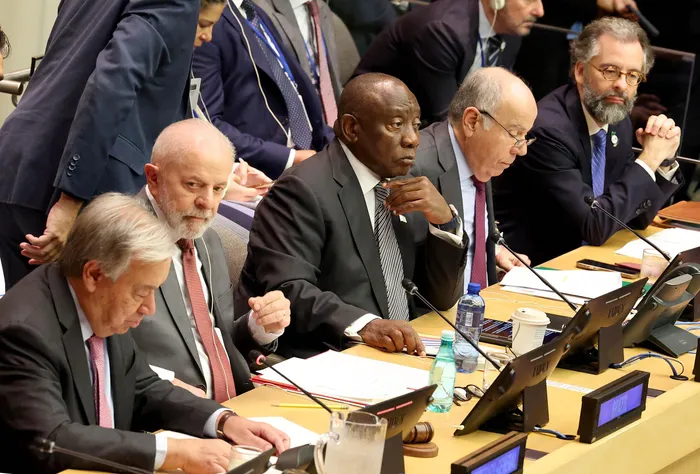BRICS and G20 poised to reshape geopolitical landscape
The Future of Multilateralism:

President Cyril Ramaphosa addressing the G20 High Level Opening Session on the margins of the 79th Session of the General Assembly in New York. South Africa assumed the G20 Presidency this year under the theme ‘Solidarity, Equality and Sustainable Development’.
Image: Kopano Tlape| GCIS
Ashraf Patel
In 2025, the scale, scope, and velocity of Trumpism are so disruptive that new forms of partnerships are evolving in ensuring the global governance consensus and saving UN Multilateralism. The Global South nations, especially G77, desperately need multilateralism to function and for fair WTO and WHO to work in order to broaden the benefits of trade, financial reforms and any hope for the UN SDGs.
The BRICS Rio communique in July is significant. The 130-point plus final declaration, not only thoroughly detailing every major issue, with calculated moderation, but resolutely setting a trademark BRICS tone – and a clear set of humanistic values – focused in three strategic pillars: economy-finance; designing a new global security framework; and cultural and people-to-people exchanges, the over-arching umbrella of inclusiveness and mutual respect.
The following week, the G20 Finance Ministers (minus the US ) meeting in Zimbali was unable to reach a consensus statement on key issues of global minimum tax and African debt relief. While both the BRICS and G7 core are members of these groupings, prioritising different themes and modalities is proving illusory.
Saving Multilateralism
Both G20 and BRICS blocs are converging out of necessity at this moment in time. The BRICS Rio July 2025 declaration is groundbreaking in its scope and depth and committee clarity in saving the UN system and reforming multilateral institutions for common development and humanity, adopting the Leaders framework, declaration on Climate Finance, AI Governance and Partnership on Elimination of Diseases. (BRICS Rio Declaration https://brics.br )
In an age where AI is leading to deepening inequalities and disruptions, the BRICS commitment to AI Governance shows a deep commitment to multilateralism. Aligned to the UN Pact for the Future, the BRICS declaration is rooted in UN principles that balance both Digital Industrialisation, AI inclusion and privacy safeguards. There is good alignment with both G7 and G20 and the new EU AI Act.
Ruptures in peace, security and climate pathways
Despite these new alignments between both Global North and South formations in saving multilateralism, it is in the area of Peace and Security where major real geopolitics come into play. The BRICS plus is anchored in the Non-Aligned movement, while the core G7 is still committed to preserving Western hegemony. Indeed, the announcement by NATO and EU core states in increasing defence budgets to 5% of GDP - and the drastic cuts in development aid is sobering and will negatively impact the UN Development agenda.
Here, realpolitik rooted in geo-political fractures is laid bare in the grave conflicts of Gaza, Ukraine, Sudan, DRC, Libya and numerous war zones. Here, the UN SC have so far failed to find consensus. Groups such as the Hague Group, which are examples of responsible nations committed to international law, are converging to confront the Genocide in Gaza, and such formations can catalyse new UN reforms and preserve the UN Charter.
Finance reform and the African Debt crisis
Last week’s G20 Finance ministers meeting and the lack of any concrete agreement on Africa’s debt crisis or global minimum tax expose the lack of coherence in the G20 model. The G20 Common Framework is essential in committing nations to financial reforms. So far, ministers are engaged in merely the ‘MDB Roadmaps’, essentially talks about talks, a painful road that does not guarantee a global finance and tax deal. Sadly, given that the G20 in 2025 is billed as the African Union's year, its core development agenda relevant to Africa is still elusive, and unlikely to bear fruit. SA is now ‘treading lightly ’as we hand over our G20 baton to the Trump administration later this year, which has stated it will ignore most of our G20 agenda.
The EU's Climate Moment of Truth arrives.
Another area that is unravelling is the pathways to climate change mitigation. The EU, which has been the standard bearer of climate and the ‘Just Energy Transition JET agenda, faces its moment of Truth.
The scale of scope of Europe’s Big Oil scouring Africa is a throwback to the early 20th-century colonialisation of Africa. Today, it's Oil giants - BP, Total, Shell, ENI - are making a big play for oil and gas in African states like Angola, Mozambique and Nigeria. This is akin to the early 20th century great oil frontier. In South Africa, Shell Oil is embroiled in yet another controversial exploration in the Karoo and Northern Cape. Meanwhile, South Africa's leading coal export destination are EU nations including Germany and the UK that are supposedly at the forefront of the Just Energy Transition (JET).
The EU and G7's signature JET project is riddled with contradiction and will make the UN COP 30 deal much more difficult, as the EU wants ‘Green cake and Oil’. The EU's CBAM program further raises trade barriers for Africa, leading to further deindustrialisation and job losses, thus fuelling the migration crisis northwards. Its glaring contradictions are no longer tenable as the EU is no different from the Trump administration's stated policy- ‘Drill Baby Drill’. The EU is drilling for oil in Africa and globally, but not in their backyards.
As the Trump 2.0 trade wars and economic nationalism deepens, an unlikely alliance of G20, BRICS and G77 can play a central role in saving multilateralism, the UN and global governance- but each with a vastly different focus and modalities.
Will a new consensus emerge and the centre hold or rupture?
* Ashraf Patel is a Senior Research Associate at the Institute for Global Dialogue, UNISA.
** The views expressed do not necessarily reflect the views of IOL, Independent Media or The African.